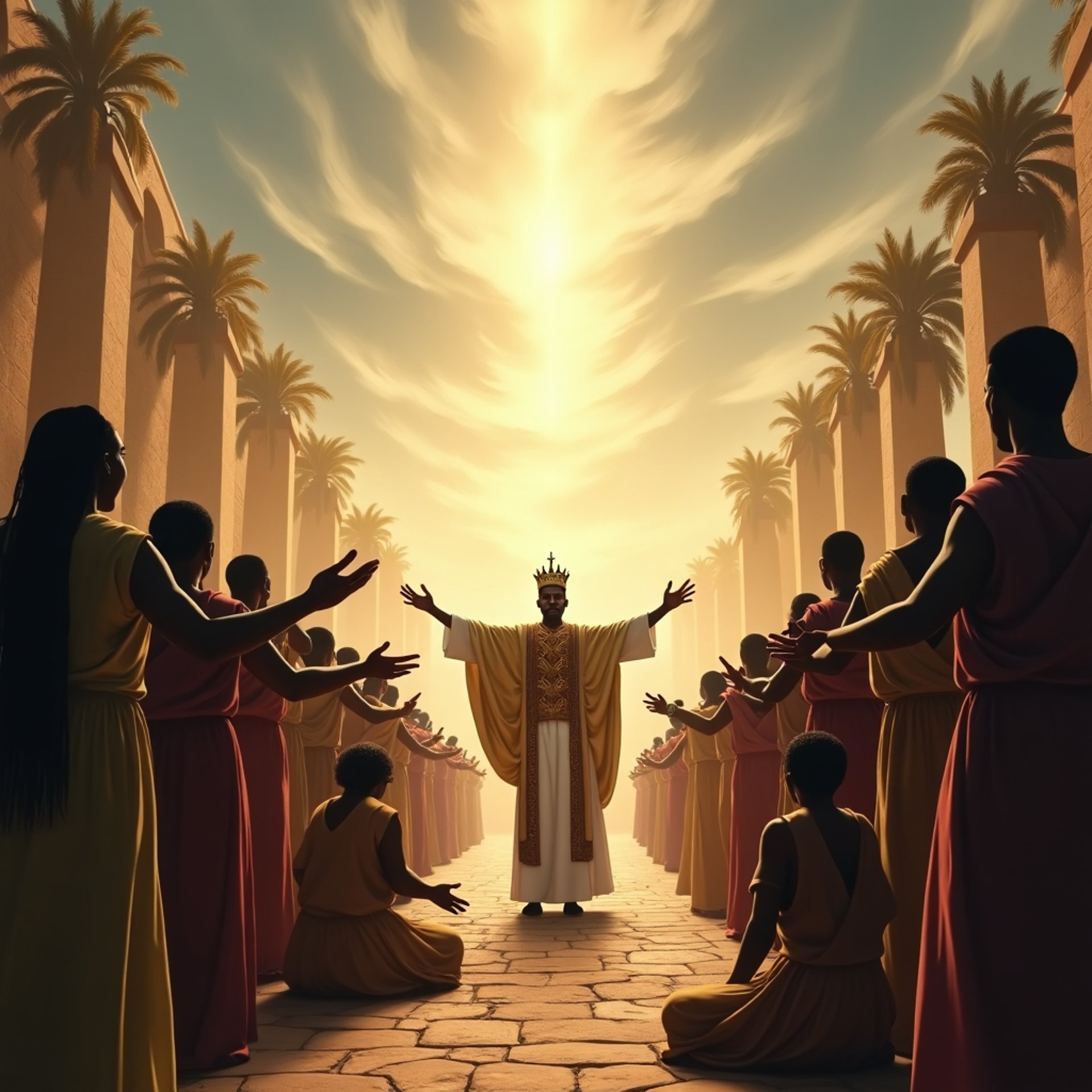
Comprehensive Analysis of Israelite History and Biblical Tribes Preview
The intertwined narratives of Jewish identity evolution, Black Israelite history, and African resistance to colonialism form a complex tapestry of resilience, cultural exchange, and identity formation. From biblical times to the present, Jewish identity has transformed through exile, diaspora, and various cultural influences, evolving from a primarily ethnic-religious identity to a diverse spectrum encompassing secular and religious dimensions. Paralleling this, the Black Israelite movement emerged in the late 19th century, claiming African American descent from ancient Israelites and influencing contemporary discussions on race and religion. African resistance to colonialism manifested in various forms, including armed struggles like the Maji Maji Rebellion and Zulu Wars, cultural preservation efforts, and political movements ranging from early nationalism to pan-Africanism. These resistance efforts, while often costly, laid the groundwork for independence and shaped post-colonial African identities. The impact of colonialism on African societies was profound, disrupting traditional systems, altering economies, and imposing foreign cultural elements. These interconnected histories highlight the ongoing negotiation of identity, resistance to oppression, and the enduring influence of historical forces on contemporary Jewish and African societies, emphasizing themes of resilience, cultural adaptation, and the quest for self-determination in the face of significant challenges.
HERSTORYFOR SALERESEARCH
About us this story
The story of Black Israelites is fundamentally a narrative of divine covenant, cultural resilience, and spiritual identity. Rooted in the biblical promise to Abraham, this journey transcends mere historical documentation—it is a profound exploration of collective memory, survival, and spiritual inheritance.
Key Historical Touchstones
Biblical Origins: The promise to Abraham and his descendants
Forced Migrations: Babylonian exile, Roman dispersal
Cultural Preservation: Maintaining identity through centuries of displacement
Spiritual Heritage: More Than a Historical Footnote
Identity as Resistance
Black Israelite identity represents a powerful form of spiritual and cultural resistance. It challenges:
Colonial narratives of erasure
Simplistic historical representations
Reductive understanding of cultural continuity
Theological Dimensions
Interpretation of biblical promises
Spiritual self-determination
Reclaiming ancestral narratives
Contemporary Realities: Navigating Identity in Modern Context
Challenges of Recognition
Ongoing debates about historical authenticity
Struggles with institutional recognition
Complex intersections of race, religion, and cultural identity
Empowerment Through Narrative
Reclaiming historical agency
Challenging dominant historical paradigms
Celebrating resilience and spiritual continuity
Philosophical Reflections: Beyond Binary Thinking
Free Thinking and Open Minds
The Black Israelite narrative invites us to:
Question established historical narratives
Embrace complexity
Recognize multiple truths
Love as a Transformative Force
Understanding over judgment
Compassion in historical interpretation
Recognizing shared human experience
Call to Reflection
This is not just a historical account—it’s an invitation to:
Listen deeply
Challenge preconceptions
Embrace the complexity of human experience
“Our history is not a wound, but a testament to resilience. Not a burden, but a bridge to understanding.”
Key Themes for Dialogue
Spiritual Inheritance
Cultural Resilience
Narrative Reclamation
Collective Memory
#BlackHistory #SpiritualHeritage #CulturalIdentity #Freethinking #OpenMind #Love
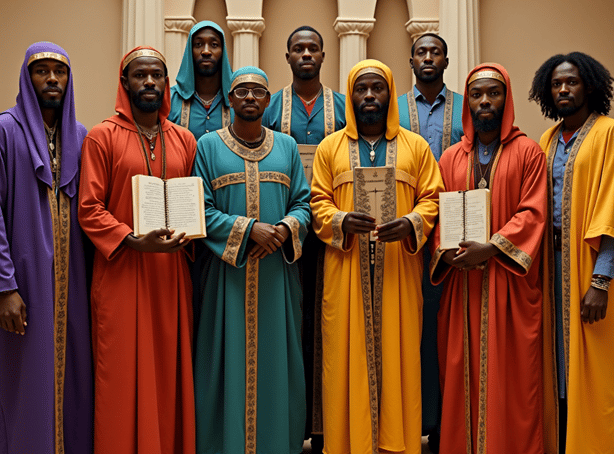

Unveiling the Narrative: Black Israelites - Beyond Historical Margins
The Covenant’s Genesis: From Abraham to Diaspora
Roots of Promise

I. The Israelites: Origins and Biblical Context
A. Patriarchal Period
1. Abraham’s covenant with God
o Call of Abraham (Genesis 12:1-3)
Abraham's covenant with God, particularly the Call of Abraham, is a pivotal moment in biblical history, marking the beginning of the Israelite narrative. In Genesis 12:1-3, God calls Abram (later renamed Abraham) with a divine command and promise:
1. The Command: God instructs Abram to leave his country, his people, and his father's household to go to a land that God will show him.
2. The Promises: God makes several significant promises to Abram:
· To make him into a great nation
· To bless him
· To make his name great
· To make him a blessing to others
3. Universal Blessing: God declares that all peoples on earth will be blessed through Abram.
This call sets in motion the journey that will lead to the formation of the Israelite people. It establishes a special relationship between God and Abram, laying the foundation for the concept of chosenness in Jewish tradition and playing a crucial role in the theological narratives of Christianity and Islam as well.
o Covenant ceremony (Genesis 15)
The covenant ceremony described in Genesis 15 is a pivotal moment in the Abrahamic narrative, often referred to as the "Covenant Between the Parts" or "Covenant of the Pieces." This event further solidifies God's promises to Abram (later renamed Abraham) and provides a symbolic enactment of the covenant. Here are the key elements of this ceremony:
1. God's Reassurance (Genesis 15:1-6):
· God appears to Abram in a vision, reassuring him of divine protection and reward.
· Abram expresses concern about his childlessness.
· God promises Abram numerous descendants, comparing them to the stars in the sky.
· Abram believes God, and it is credited to him as righteousness.
2. The Covenant Ritual (Genesis 15:7-11, 17):
· God instructs Abram to prepare specific animals: a heifer, a goat, a ram (all three years old), a dove, and a young pigeon.
· Abram cuts the animals in half (except the birds) and arranges the pieces opposite each other.
· Birds of prey descend on the carcasses, but Abram drives them away.
· At sunset, Abram falls into a deep sleep.
· A smoking firepot and a flaming torch (representing God's presence) pass between the pieces of the animals.
3. God's Prophecy (Genesis 15:12-16):
· God foretells the future enslavement of Abram's descendants in Egypt for 400 years.
· God promises to judge the nation that enslaves them and that Abram's descendants will eventually leave with great possessions.
· God assures Abram of a long life and peaceful death.
4. The Land Promise (Genesis 15:18-21):
· God formally makes a covenant with Abram, promising his descendants the land from the river of Egypt to the Euphrates.
· The current inhabitants of the land are listed, implying future conquest.
Significance of the Ceremony:
· It symbolically seals God's promises to Abram regarding descendants and land.
· The passing of God (represented by the firepot and torch) between the animal pieces signifies a self-imprecatory oath, essentially saying, "May I be cut in pieces if I fail to keep this covenant."
· It foreshadows key elements of Israelite history, including the Exodus from Egypt.
· This covenant is unconditional; its fulfillment depends solely on God, not on Abram's actions.
This covenant ceremony is a foundational event in the Abrahamic faiths, establishing the special relationship between God and Abraham's descendants, and setting the stage for much of the biblical narrative that follows.
o Promise of numerous descendants and land
The promise of numerous descendants and land is a central component of God's covenant with Abraham, forming the foundation of the Israelite narrative and identity. This promise is reiterated and expanded upon throughout Genesis:
1. Numerous Descendants:
· Initially promised in Genesis 12:2: "I will make you into a great nation"
· Reinforced in Genesis 15:5: "Look up at the sky and count the stars—if indeed you can count them... So shall your offspring be"
· Further emphasized in Genesis 17:6: "I will make you very fruitful; I will make nations of you, and kings will come from you"
2. Promise of Land:
· First mentioned in Genesis 12:1: "Go to the land I will show you"
· Specified in Genesis 15:18-21: "To your descendants I give this land, from the Wadi of Egypt to the great river, the Euphrates"
· Reaffirmed in Genesis 17:8: "The whole land of Canaan, where you now reside as a foreigner, I will give as an everlasting possession to you and your descendants after you"
These promises are significant because:
· They establish the concept of the Promised Land, central to Jewish identity and history
· They form the basis for the idea of the Israelites as a chosen people
· They set the stage for much of the biblical narrative, including the Exodus and conquest of Canaan
· They continue to influence religious and political discourse in the modern Middle East
The fulfillment of these promises becomes a recurring theme throughout the Old Testament, shaping the Israelites' understanding of their relationship with God and their place in history.
2. Isaac and the promise
o Birth as fulfillment of promise (Genesis 21:1-7)
The birth of Isaac, as described in Genesis 21:1-7, represents a crucial fulfillment of God's promise to Abraham and Sarah. This event is significant in the Abrahamic narrative for several reasons:
1. Miraculous Conception:
· Sarah was well past childbearing age (Genesis 18:11)
· The birth demonstrates God's power to fulfill promises against natural odds
2. Fulfillment of Divine Promise:
· God had promised Abraham a son through Sarah (Genesis 17:16)
· The birth occurs "at the very time God had promised him" (Genesis 21:2)
3. Name and Its Meaning:
· Isaac means "he laughs" in Hebrew
· This name reflects both Sarah's initial disbelief (Genesis 18:12) and her later joy (Genesis 21:6)
4. Sarah's Reaction:
· "God has brought me laughter, and everyone who hears about this will laugh with me" (Genesis 21:6)
· Her statement reflects both joy and a sense of vindication
5. Abraham's Age:
· Abraham was 100 years old when Isaac was born (Genesis 21:5)
· This emphasizes the miraculous nature of the birth
6. Covenant Continuation:
· Isaac's birth ensures the continuation of God's covenant with Abraham
· He becomes the heir through whom the promises will be fulfilled
This event serves as a pivotal moment in the patriarchal narratives, demonstrating God's faithfulness to His promises and setting the stage for the future of the Israelite people. It also establishes a pattern of divine intervention in the birth of key figures in biblical history.
o Continuation of covenant (Genesis 26:2-5)
The continuation of the covenant with Isaac, as described in Genesis 26:2-5, is a crucial moment in the patriarchal narrative. This passage reaffirms God's promises to Abraham and extends them to his son Isaac:
Divine Appearance:
God appears to Isaac during a famine, instructing him not to go to Egypt
Promise of Divine Presence:
"Stay in this land for a while, and I will be with you and will bless you" (Genesis 26:3)
Land Promise Reaffirmed:
God promises to give Isaac and his descendants all the lands originally promised to Abraham
Numerous Descendants:
The promise of countless descendants is reiterated: "I will make your descendants as numerous as the stars in the sky" (Genesis 26:4)
Universal Blessing:
God reaffirms that all nations on earth will be blessed through Isaac's offspring
Covenant Continuity:
God explicitly states that these promises are a continuation of the covenant made with Abraham
Reason for the Covenant:
God cites Abraham's obedience as the reason for maintaining the covenant with Isaac
This passage demonstrates the continuity of God's covenant from Abraham to Isaac, establishing a generational promise that will become central to Israelite identity. It also reinforces the themes of divine guidance, promised land, and the chosen lineage that are foundational to the biblical narrative.
3. Jacob (Israel) and the twelve sons
o Jacob’s wrestling and name change to Israel (Genesis 32:22-32)

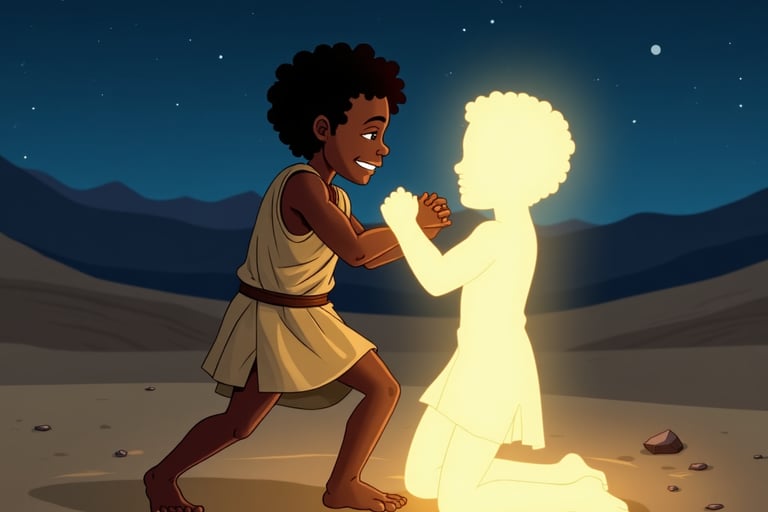

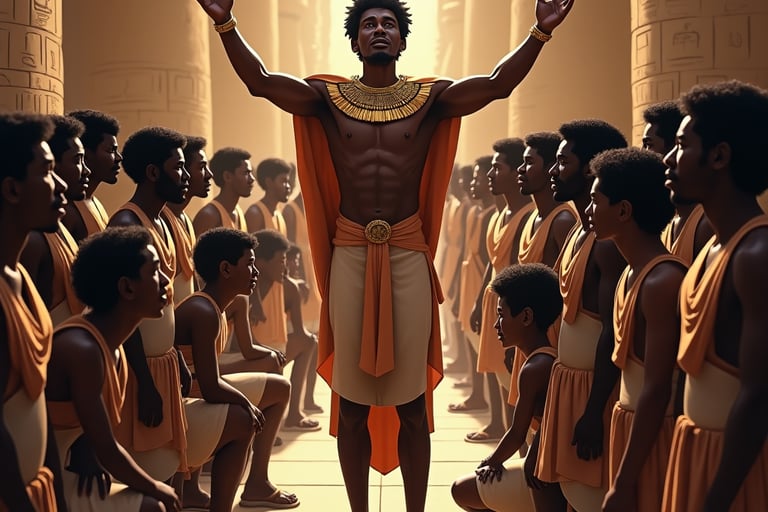

· Emotional reunion and reconciliation
The emotional reunion and reconciliation between Joseph and his brothers is a powerful climax to the narrative, occurring in Genesis 45:
1. Joseph reveals his identity (Genesis 45:1-3):
· Overwhelmed with emotion, Joseph dismisses all attendants
· Weeps loudly and declares, "I am Joseph!"
· His brothers are terrified and speechless
2. Reassurance and explanation (Genesis 45:4-8):
· Joseph asks his brothers to come closer
· Explains that God sent him to Egypt to preserve life
· Emphasizes divine providence in the events that transpired
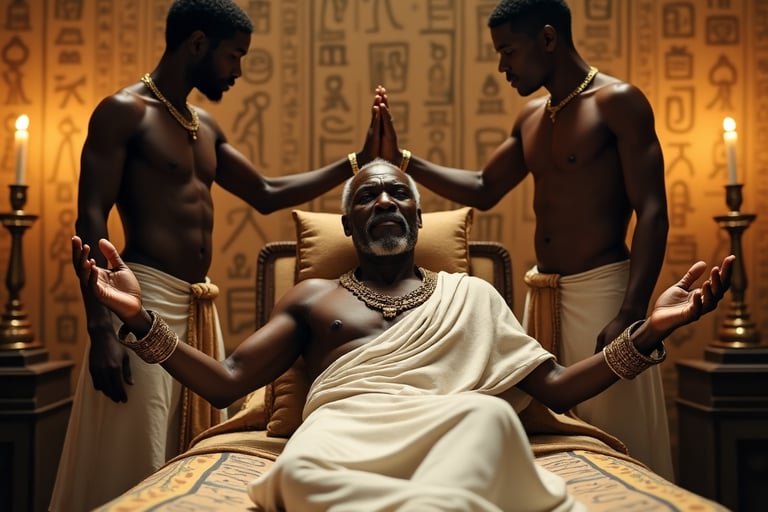

1. Jacob's Final Days (Genesis 48-49):
· Blesses Joseph's sons, Ephraim and Manasseh
Jacob's blessing of Joseph's sons, Ephraim and Manasseh, is a significant event described in Genesis 48:
1. Joseph brings his sons to Jacob (Genesis 48:1-2):
· Jacob is ill and nearing death
· Joseph brings Ephraim and Manasseh to receive a blessing
2. Jacob recalls God's promises (Genesis 48:3-7):
· Recounts God's appearance at Luz (Bethel)
· Mentions the promise of numerous descendants and land
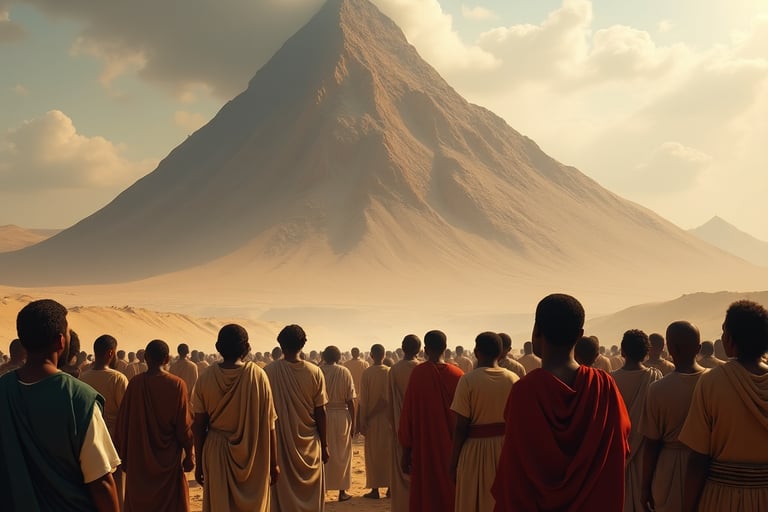

1. Setting (Exodus 19:16-19):
· The Israelites are gathered at the foot of Mount Sinai
· There's thunder, lightning, a thick cloud, and a loud trumpet blast
· The mountain is covered in smoke as God descends in fire
____________ CUT________________
This divine appointment highlights several important aspects:
1. Continuity of leadership: God ensures a smooth transition from Moses to Joshua, maintaining the divine guidance of the Israelites.
2. Divine selection: Joshua is specifically chosen by God, emphasizing the theocratic nature of Israelite leadership.
3. Encouragement: The command to be "strong and courageous" acknowledges the challenges ahead and provides divine reassurance.
4. Promise fulfillment: Joshua's role is directly linked to fulfilling God's promise of bringing the Israelites into the Promised Land.
5. Divine presence: God assures Joshua of His continued presence, a crucial element for the success of the upcoming conquest.
This appointment sets the stage for Joshua's leadership during the conquest of Canaan and the settlement of the Israelites in the Promised Land.
Joshua's preparation for the conquest of Canaan involved two key events:
Crossing the Jordan (Joshua 3)
1. Sending spies to Jericho (Joshua 2):
· Joshua secretly sends two spies to scout Jericho
· The spies are hidden by Rahab, a prostitute in Jericho
· Rahab requests protection for her family in exchange for her help
· The spies return with encouraging news about the fear of Canaanites
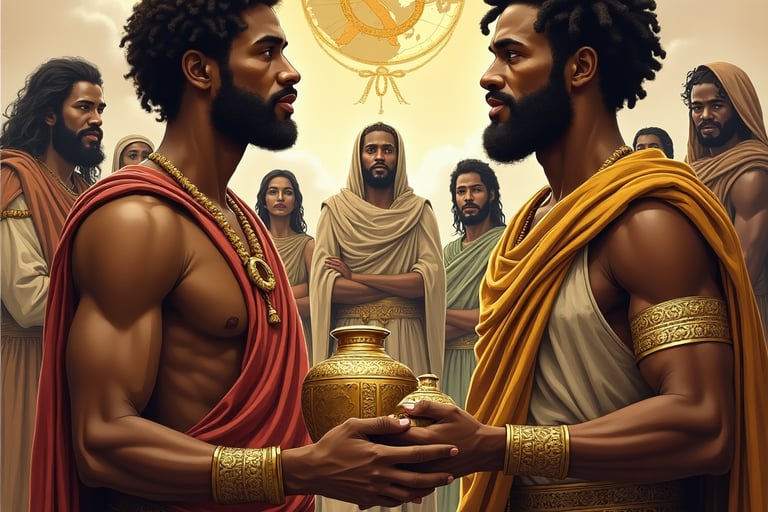

B. Ephraimites and Manassites
Sons of Joseph
Joseph received a double portion through his sons (Genesis 48:5-6)
Adopted by Jacob as his own sons, elevating them to tribal status
Elevated to full tribal status
Replaced Joseph in the list of twelve tribes
Ephraim often used as a synonym for the entire Northern Kingdom
Manasseh split into two half-tribes, one on each side of the Jordan
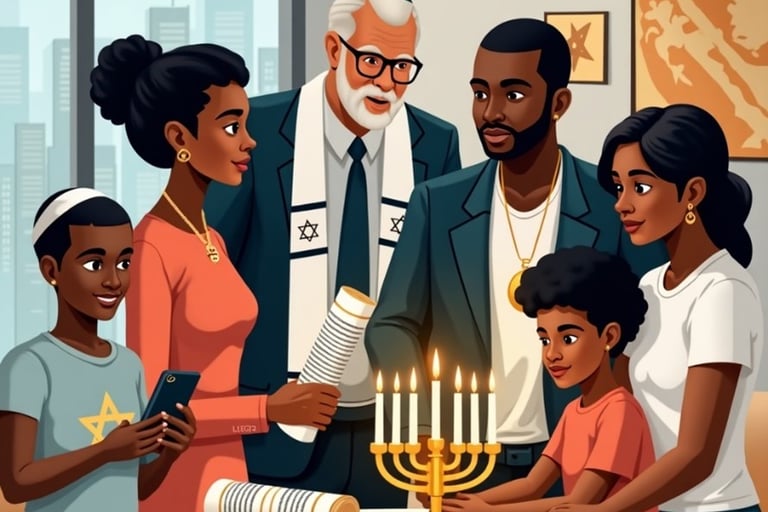

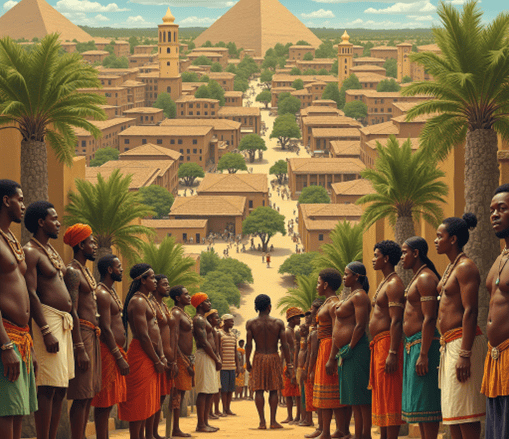

I. Introduction
This document provides a detailed account of the historical events and interactions that shaped the native-born, brown-skinned “Black” communities and tribes of Africa, from biblical times through the colonial era. It aims to present an accurate portrayal of these communities, their racial and ethnic identities, and the impact of various historical events on their social, economic, and cultural structures.
II. Biblical African Tribes and Communities
A. Egyptian and Nubian Civilizations
1. Ancient Egypt
o Racial composition: Mixed, including brown-skinned Africans
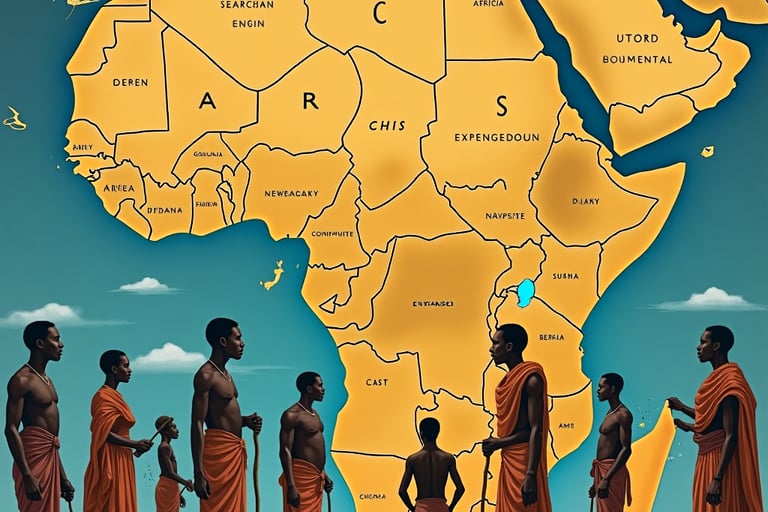

1. Establishment of colonial borders
o Separation of ethnic groups
The establishment of colonial borders in Africa, particularly following the Berlin Conference of 1884-1885, led to the separation of many ethnic groups. This process had profound and lasting effects on African societies:
1. Arbitrary divisions: Colonial powers drew borders with little regard for existing ethnic, cultural, or linguistic boundaries. This resulted in many ethnic groups being divided across multiple countries.
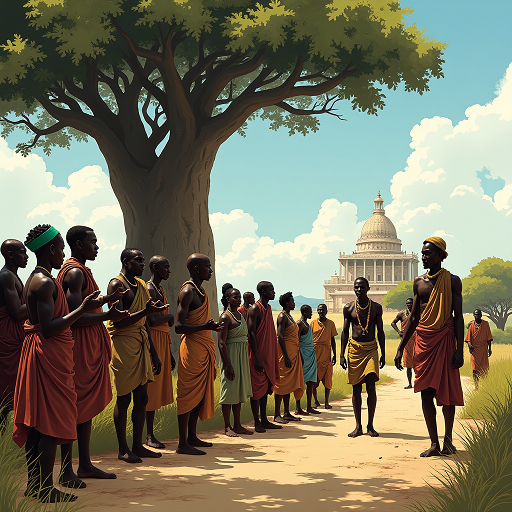

Support Our Mission
Your $2 purchase helps us provide life-changing educational materials. Join us in making a difference!


